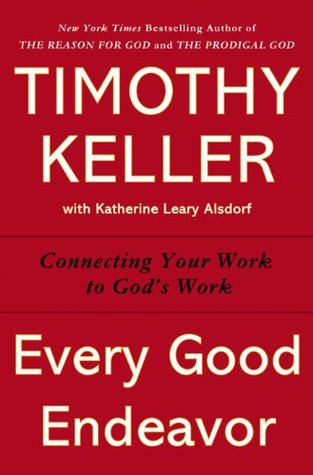More on this book
Community
Kindle Notes & Highlights
Read between
April 8 - December 28, 2019
Entertainment distracts us from our discomfort.
And
doing good helps bolster our identity as a good person. But the Bible locates the root issue ...
This highlight has been truncated due to consecutive passage length restrictions.
there is an inadequate awareness of the seriousness of sin, moral perceptions are
clouded, and the self-centered view of values is well beneath the God-centered view. . . . The blindness of sin is beginning to take effect.
“Do you find the two great tasks in life—love and work—to be excruciatingly
hard? This explains why.
God ties the pain of love and marriage and the pain of work very closely to...
This highlight has been truncated due to consecutive passage length restrictions.
Both childbearing and farming are now called ...
This highlight has been truncated due to consecutive passage length restrictions.
work, even when it bears fruit, is always painful, often miscarries, and sometimes kills us.
Work is not itself a curse, but it now lies with all other aspects of human life under the curse of sin.
“Part of the curse of work
in a fallen world is its frequent fruitlessness.
in all our work, we will be able to envision far more than we can accomplish, both because of a lack of ability and because of resistance in the environment around us.
But even during times when you are
you may be bitterly disappointed with the results.
Most people achieve very few of these goals in their lifetimes, and even those who seem from a distance to lead charmed work lives will sense that their true aspirations are
thwarted as often as they are reached.
So you—and your sin—were part of the problem. You, to put it starkly, were a thorn.
So even on our best days, each of us is working within a system that feels stacked against us.
It is important for us to understand and hold in tension what the Bible says about creation and about the fall—about God’s plan for work, and also about the problems of work in a broken world.
The explosion of books about ‘changing the world’ fits our self-image.
image.”
my children’s generation has a more naïve and utopian view of work than is suggested by the Bible in its description of the world’s fall into sin.
Just because you cannot realize your highest aspirations in work does not mean you have chosen wrongly, or are not called to your profession, or that you should spend your life looking for the perfect career that is devoid of frustration. That would be a
fruitless search for anyone. You should expect to be regularly frustrated in your work even though you may be in exactly the right vocation.
God can—and often does—change what he calls us to do.
But because of the fall of the human race, our work is also profoundly frustrating, never as fruitful as we want, and often a complete failure.
Work will still bear some fruit, though it will always fall short of its promise. Work will be both frustrating and fulfilling, and sometimes—
There will be work in the paradise of the future just like there was in the paradise of the past, because God himself takes joy in his work.
Christians have, through their hope in God’s story of redemption for the world he created, a deep consolation that enables them to work with all their being and never be ultimately discouraged by the frustrating present reality of this world,
many others experience no satisfaction or fulfillment in their work even when they have realized their aspirations and become successful.
“fictional autobiography.”100 In this form, the writer could introduce a fictional character, give a description of his or her life’s course, and then conclude with general insights and teachings drawn from the case study of the recounted life.
The author of Ecclesiastes is using the character of the Philosopher to push readers toward an understanding of the transcendent uniqueness and necessity of God.
If we base our lives on work and achievement, on love and pleasure, or on
knowledge and learning, our existence becomes anxious and fragile—because circumstances in life are always threatening the very foundation of our lives, and death in...
This highlight has been truncated due to consecutive passage length restrictions.
Nothing is more satisfying than a sense that through our work we have accomplished some lasting achievement.
for in the end there are no lasting achievements.
His appropriate ambition had
become his misplaced salvation; so his considerable success was not enough.
Another reason that work feels so alienating is the injustice and depersonalization ever-present in all social systems,
“If you see the poor oppressed in a district, and justice and rights denied, do not be surprised at such things; for one official is eyed by a higher one, and over them both are others higher still.”
His job is typical of manufacturing work or even office work which has been subdivided and simplified for the sake of efficiency and higher productivity.”106 The great shift
from an industrial economy to a knowledge and service economy has improved the immediate working conditions of many but has locked countless others into low-paying service sector jobs that experience the same alienating disconnection from the fruits or products of their work.
Work can even isolate us from one another.
Work involves “depriving”—delayed gratification and sacrifice. But he asks,
that people today have more power to choose their line of work than did people in the past.
But there was little interest in or awareness of the ministry, the military, the academy, government service or the zillion other sectors.
Brooks’s first point is that so many college students do not choose work that actually fits their abilities, talents, and capacities, but rather choose work that fits
within their limited imagination of how they can boost their own self-image.


